Detailed History Essay: The War of 1812, Its Causes and Impacts
VerifiedAdded on 2023/01/18
|15
|5017
|83
Essay
AI Summary
This essay provides a comprehensive overview of the War of 1812, often referred to as the "Forgotten War." It begins by exploring the historical context, including the tensions between the United States, Great Britain, and France, and the key events that led to the conflict. The essay delves into the causes of the war, such as disputes over trade, impressment of American sailors, and territorial ambitions. It examines the key battles and military campaigns, including the burning of Washington D.C., the naval battles, and the Battle of New Orleans. The essay also discusses the key figures involved, such as President James Madison, and assesses the significance of the war, its impact on American identity, and its long-term consequences for the nation's development and international relations. The essay draws on various sources to provide a balanced and insightful analysis of this pivotal period in American history.
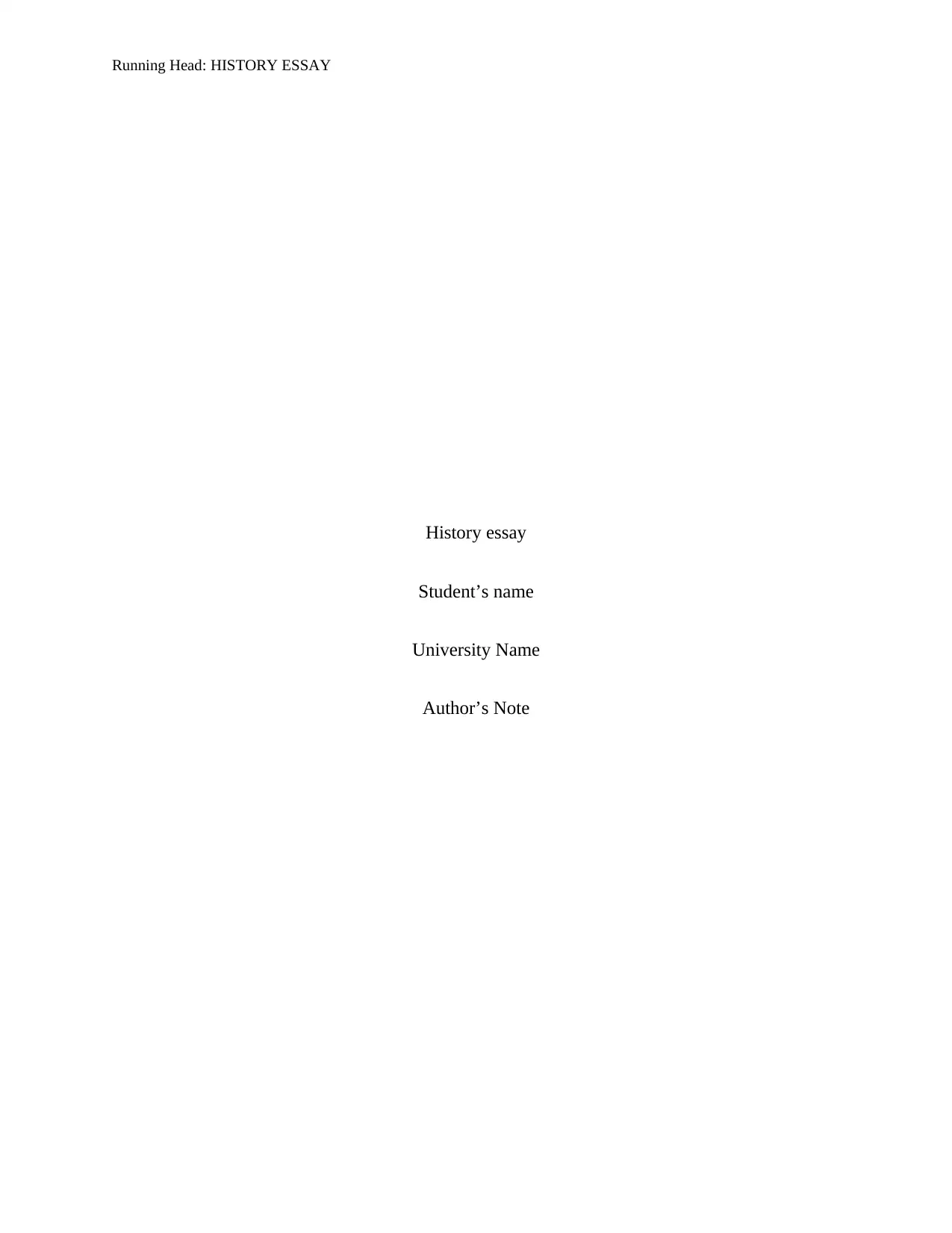
Running Head: HISTORY ESSAY
History essay
Student’s name
University Name
Author’s Note
History essay
Student’s name
University Name
Author’s Note
Paraphrase This Document
Need a fresh take? Get an instant paraphrase of this document with our AI Paraphraser
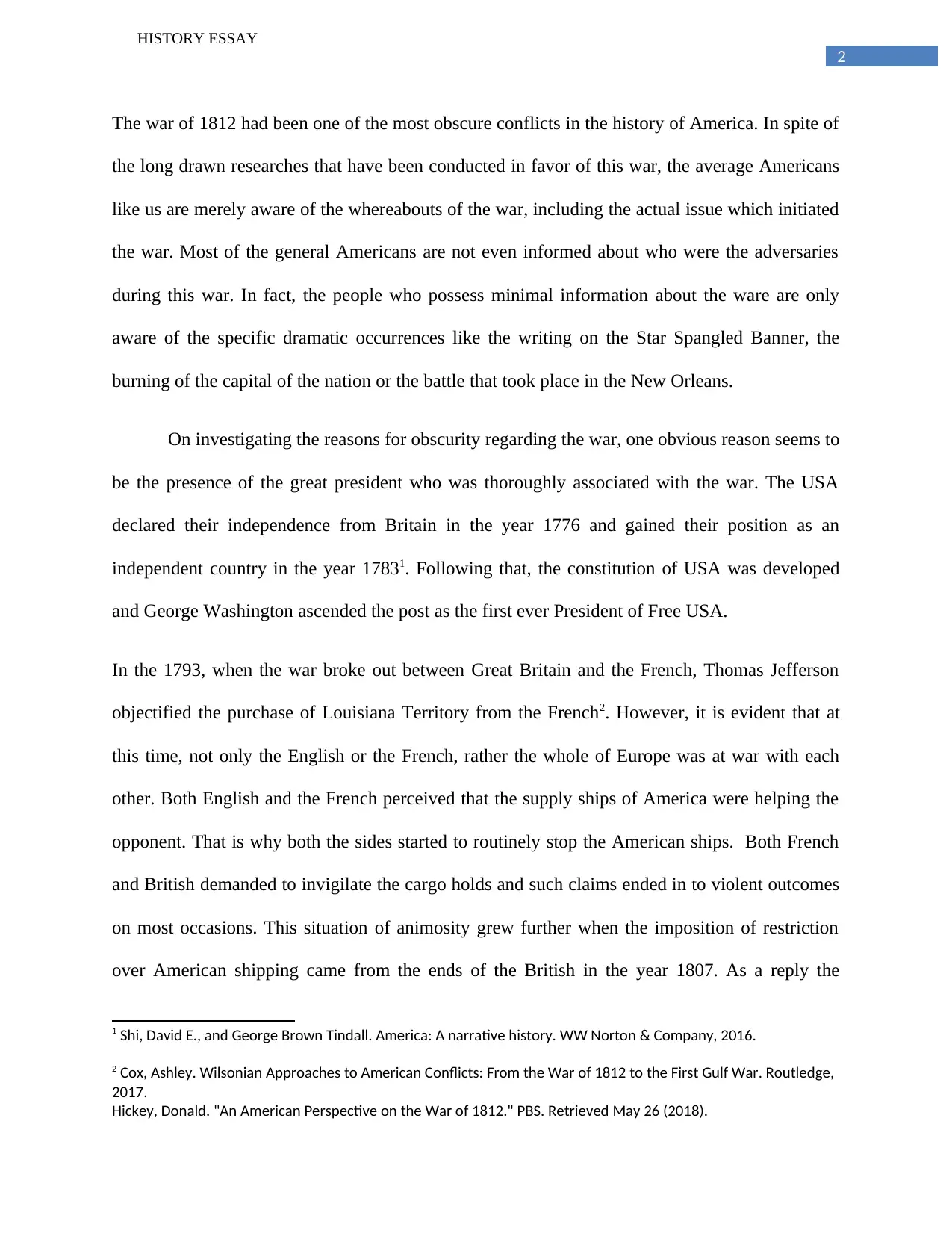
2
HISTORY ESSAY
The war of 1812 had been one of the most obscure conflicts in the history of America. In spite of
the long drawn researches that have been conducted in favor of this war, the average Americans
like us are merely aware of the whereabouts of the war, including the actual issue which initiated
the war. Most of the general Americans are not even informed about who were the adversaries
during this war. In fact, the people who possess minimal information about the ware are only
aware of the specific dramatic occurrences like the writing on the Star Spangled Banner, the
burning of the capital of the nation or the battle that took place in the New Orleans.
On investigating the reasons for obscurity regarding the war, one obvious reason seems to
be the presence of the great president who was thoroughly associated with the war. The USA
declared their independence from Britain in the year 1776 and gained their position as an
independent country in the year 17831. Following that, the constitution of USA was developed
and George Washington ascended the post as the first ever President of Free USA.
In the 1793, when the war broke out between Great Britain and the French, Thomas Jefferson
objectified the purchase of Louisiana Territory from the French2. However, it is evident that at
this time, not only the English or the French, rather the whole of Europe was at war with each
other. Both English and the French perceived that the supply ships of America were helping the
opponent. That is why both the sides started to routinely stop the American ships. Both French
and British demanded to invigilate the cargo holds and such claims ended in to violent outcomes
on most occasions. This situation of animosity grew further when the imposition of restriction
over American shipping came from the ends of the British in the year 1807. As a reply the
1 Shi, David E., and George Brown Tindall. America: A narrative history. WW Norton & Company, 2016.
2 Cox, Ashley. Wilsonian Approaches to American Conflicts: From the War of 1812 to the First Gulf War. Routledge,
2017.
Hickey, Donald. "An American Perspective on the War of 1812." PBS. Retrieved May 26 (2018).
HISTORY ESSAY
The war of 1812 had been one of the most obscure conflicts in the history of America. In spite of
the long drawn researches that have been conducted in favor of this war, the average Americans
like us are merely aware of the whereabouts of the war, including the actual issue which initiated
the war. Most of the general Americans are not even informed about who were the adversaries
during this war. In fact, the people who possess minimal information about the ware are only
aware of the specific dramatic occurrences like the writing on the Star Spangled Banner, the
burning of the capital of the nation or the battle that took place in the New Orleans.
On investigating the reasons for obscurity regarding the war, one obvious reason seems to
be the presence of the great president who was thoroughly associated with the war. The USA
declared their independence from Britain in the year 1776 and gained their position as an
independent country in the year 17831. Following that, the constitution of USA was developed
and George Washington ascended the post as the first ever President of Free USA.
In the 1793, when the war broke out between Great Britain and the French, Thomas Jefferson
objectified the purchase of Louisiana Territory from the French2. However, it is evident that at
this time, not only the English or the French, rather the whole of Europe was at war with each
other. Both English and the French perceived that the supply ships of America were helping the
opponent. That is why both the sides started to routinely stop the American ships. Both French
and British demanded to invigilate the cargo holds and such claims ended in to violent outcomes
on most occasions. This situation of animosity grew further when the imposition of restriction
over American shipping came from the ends of the British in the year 1807. As a reply the
1 Shi, David E., and George Brown Tindall. America: A narrative history. WW Norton & Company, 2016.
2 Cox, Ashley. Wilsonian Approaches to American Conflicts: From the War of 1812 to the First Gulf War. Routledge,
2017.
Hickey, Donald. "An American Perspective on the War of 1812." PBS. Retrieved May 26 (2018).
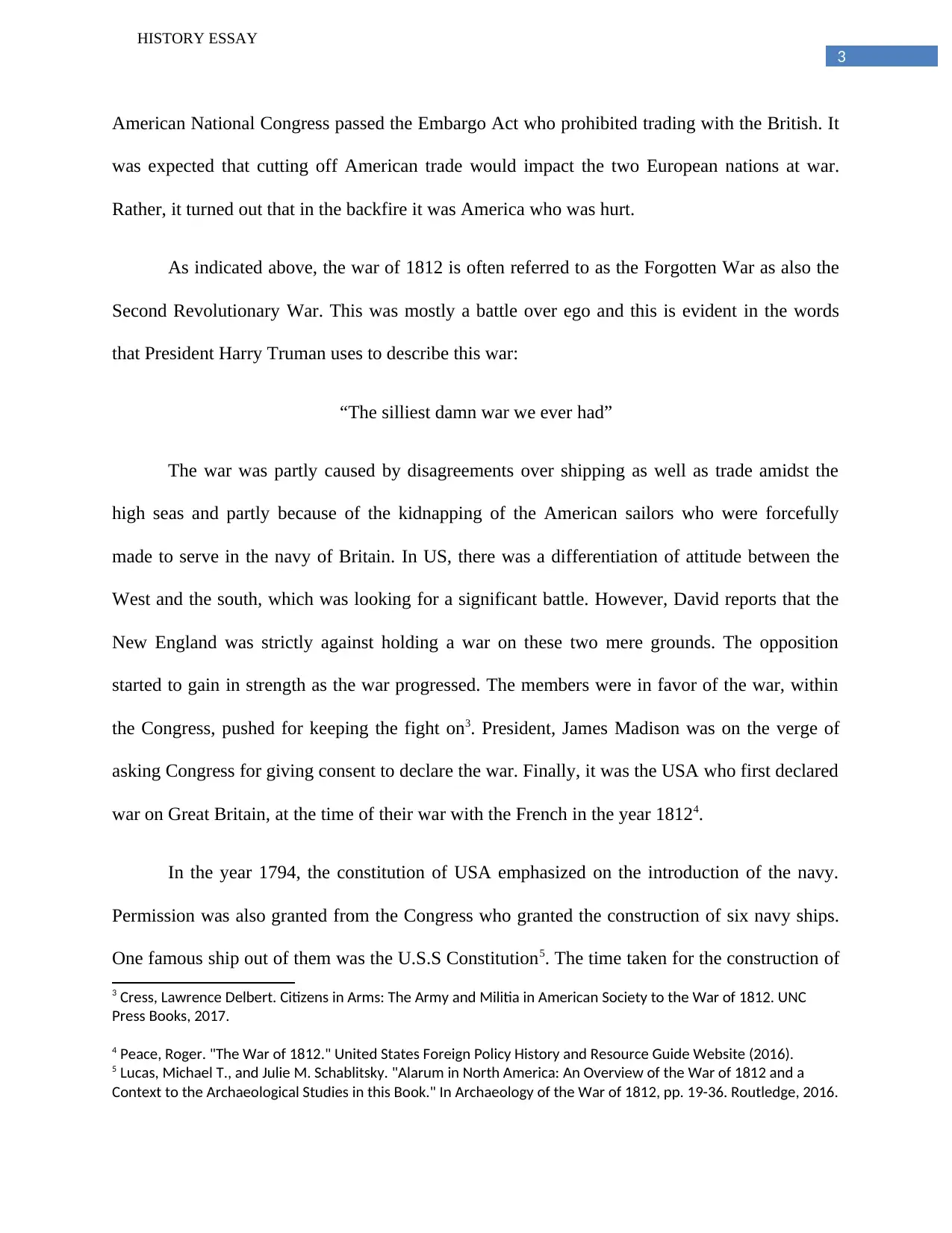
3
HISTORY ESSAY
American National Congress passed the Embargo Act who prohibited trading with the British. It
was expected that cutting off American trade would impact the two European nations at war.
Rather, it turned out that in the backfire it was America who was hurt.
As indicated above, the war of 1812 is often referred to as the Forgotten War as also the
Second Revolutionary War. This was mostly a battle over ego and this is evident in the words
that President Harry Truman uses to describe this war:
“The silliest damn war we ever had”
The war was partly caused by disagreements over shipping as well as trade amidst the
high seas and partly because of the kidnapping of the American sailors who were forcefully
made to serve in the navy of Britain. In US, there was a differentiation of attitude between the
West and the south, which was looking for a significant battle. However, David reports that the
New England was strictly against holding a war on these two mere grounds. The opposition
started to gain in strength as the war progressed. The members were in favor of the war, within
the Congress, pushed for keeping the fight on3. President, James Madison was on the verge of
asking Congress for giving consent to declare the war. Finally, it was the USA who first declared
war on Great Britain, at the time of their war with the French in the year 18124.
In the year 1794, the constitution of USA emphasized on the introduction of the navy.
Permission was also granted from the Congress who granted the construction of six navy ships.
One famous ship out of them was the U.S.S Constitution5. The time taken for the construction of
3 Cress, Lawrence Delbert. Citizens in Arms: The Army and Militia in American Society to the War of 1812. UNC
Press Books, 2017.
4 Peace, Roger. "The War of 1812." United States Foreign Policy History and Resource Guide Website (2016).
5 Lucas, Michael T., and Julie M. Schablitsky. "Alarum in North America: An Overview of the War of 1812 and a
Context to the Archaeological Studies in this Book." In Archaeology of the War of 1812, pp. 19-36. Routledge, 2016.
HISTORY ESSAY
American National Congress passed the Embargo Act who prohibited trading with the British. It
was expected that cutting off American trade would impact the two European nations at war.
Rather, it turned out that in the backfire it was America who was hurt.
As indicated above, the war of 1812 is often referred to as the Forgotten War as also the
Second Revolutionary War. This was mostly a battle over ego and this is evident in the words
that President Harry Truman uses to describe this war:
“The silliest damn war we ever had”
The war was partly caused by disagreements over shipping as well as trade amidst the
high seas and partly because of the kidnapping of the American sailors who were forcefully
made to serve in the navy of Britain. In US, there was a differentiation of attitude between the
West and the south, which was looking for a significant battle. However, David reports that the
New England was strictly against holding a war on these two mere grounds. The opposition
started to gain in strength as the war progressed. The members were in favor of the war, within
the Congress, pushed for keeping the fight on3. President, James Madison was on the verge of
asking Congress for giving consent to declare the war. Finally, it was the USA who first declared
war on Great Britain, at the time of their war with the French in the year 18124.
In the year 1794, the constitution of USA emphasized on the introduction of the navy.
Permission was also granted from the Congress who granted the construction of six navy ships.
One famous ship out of them was the U.S.S Constitution5. The time taken for the construction of
3 Cress, Lawrence Delbert. Citizens in Arms: The Army and Militia in American Society to the War of 1812. UNC
Press Books, 2017.
4 Peace, Roger. "The War of 1812." United States Foreign Policy History and Resource Guide Website (2016).
5 Lucas, Michael T., and Julie M. Schablitsky. "Alarum in North America: An Overview of the War of 1812 and a
Context to the Archaeological Studies in this Book." In Archaeology of the War of 1812, pp. 19-36. Routledge, 2016.
⊘ This is a preview!⊘
Do you want full access?
Subscribe today to unlock all pages.

Trusted by 1+ million students worldwide
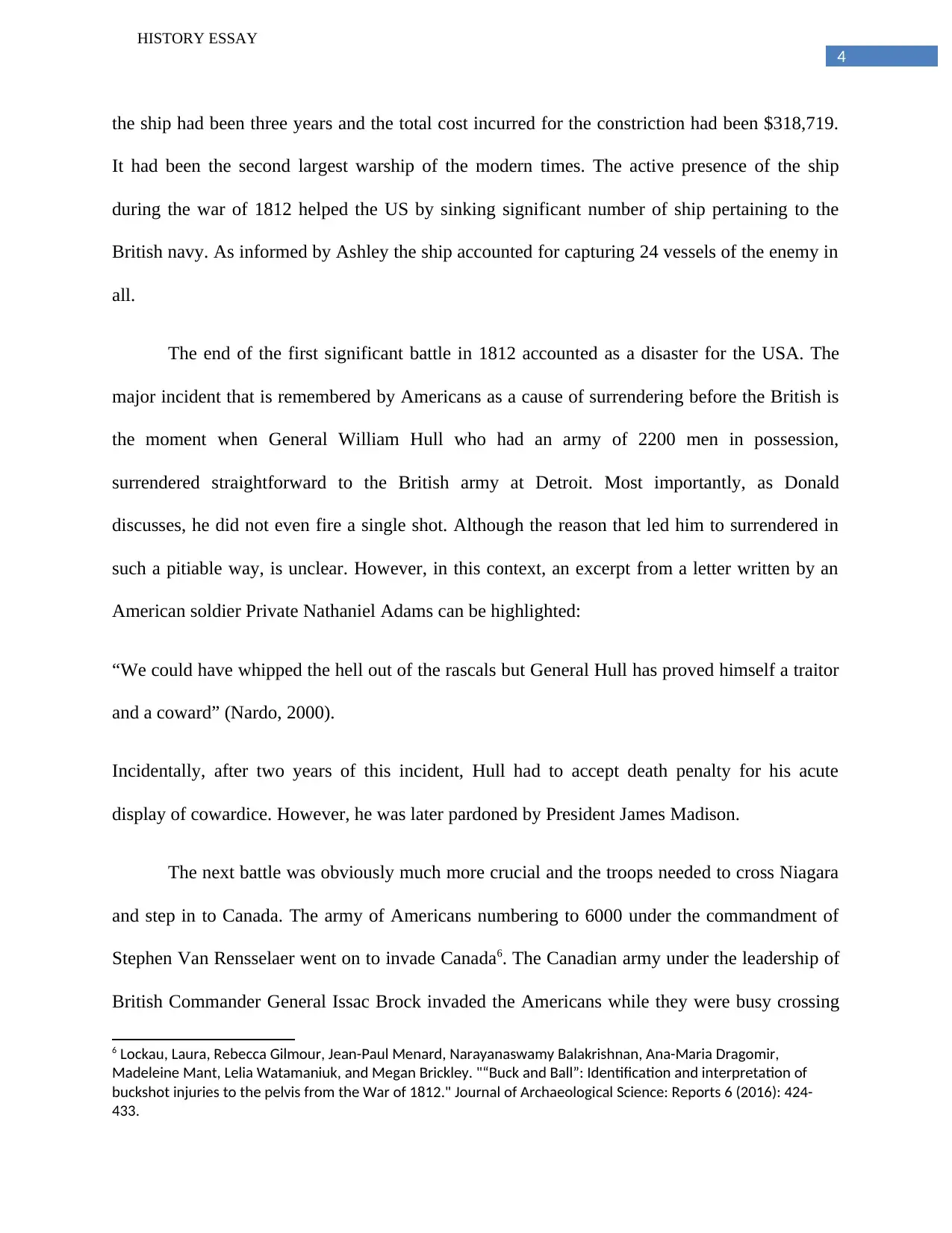
4
HISTORY ESSAY
the ship had been three years and the total cost incurred for the constriction had been $318,719.
It had been the second largest warship of the modern times. The active presence of the ship
during the war of 1812 helped the US by sinking significant number of ship pertaining to the
British navy. As informed by Ashley the ship accounted for capturing 24 vessels of the enemy in
all.
The end of the first significant battle in 1812 accounted as a disaster for the USA. The
major incident that is remembered by Americans as a cause of surrendering before the British is
the moment when General William Hull who had an army of 2200 men in possession,
surrendered straightforward to the British army at Detroit. Most importantly, as Donald
discusses, he did not even fire a single shot. Although the reason that led him to surrendered in
such a pitiable way, is unclear. However, in this context, an excerpt from a letter written by an
American soldier Private Nathaniel Adams can be highlighted:
“We could have whipped the hell out of the rascals but General Hull has proved himself a traitor
and a coward” (Nardo, 2000).
Incidentally, after two years of this incident, Hull had to accept death penalty for his acute
display of cowardice. However, he was later pardoned by President James Madison.
The next battle was obviously much more crucial and the troops needed to cross Niagara
and step in to Canada. The army of Americans numbering to 6000 under the commandment of
Stephen Van Rensselaer went on to invade Canada6. The Canadian army under the leadership of
British Commander General Issac Brock invaded the Americans while they were busy crossing
6 Lockau, Laura, Rebecca Gilmour, Jean-Paul Menard, Narayanaswamy Balakrishnan, Ana-Maria Dragomir,
Madeleine Mant, Lelia Watamaniuk, and Megan Brickley. "“Buck and Ball”: Identification and interpretation of
buckshot injuries to the pelvis from the War of 1812." Journal of Archaeological Science: Reports 6 (2016): 424-
433.
HISTORY ESSAY
the ship had been three years and the total cost incurred for the constriction had been $318,719.
It had been the second largest warship of the modern times. The active presence of the ship
during the war of 1812 helped the US by sinking significant number of ship pertaining to the
British navy. As informed by Ashley the ship accounted for capturing 24 vessels of the enemy in
all.
The end of the first significant battle in 1812 accounted as a disaster for the USA. The
major incident that is remembered by Americans as a cause of surrendering before the British is
the moment when General William Hull who had an army of 2200 men in possession,
surrendered straightforward to the British army at Detroit. Most importantly, as Donald
discusses, he did not even fire a single shot. Although the reason that led him to surrendered in
such a pitiable way, is unclear. However, in this context, an excerpt from a letter written by an
American soldier Private Nathaniel Adams can be highlighted:
“We could have whipped the hell out of the rascals but General Hull has proved himself a traitor
and a coward” (Nardo, 2000).
Incidentally, after two years of this incident, Hull had to accept death penalty for his acute
display of cowardice. However, he was later pardoned by President James Madison.
The next battle was obviously much more crucial and the troops needed to cross Niagara
and step in to Canada. The army of Americans numbering to 6000 under the commandment of
Stephen Van Rensselaer went on to invade Canada6. The Canadian army under the leadership of
British Commander General Issac Brock invaded the Americans while they were busy crossing
6 Lockau, Laura, Rebecca Gilmour, Jean-Paul Menard, Narayanaswamy Balakrishnan, Ana-Maria Dragomir,
Madeleine Mant, Lelia Watamaniuk, and Megan Brickley. "“Buck and Ball”: Identification and interpretation of
buckshot injuries to the pelvis from the War of 1812." Journal of Archaeological Science: Reports 6 (2016): 424-
433.
Paraphrase This Document
Need a fresh take? Get an instant paraphrase of this document with our AI Paraphraser
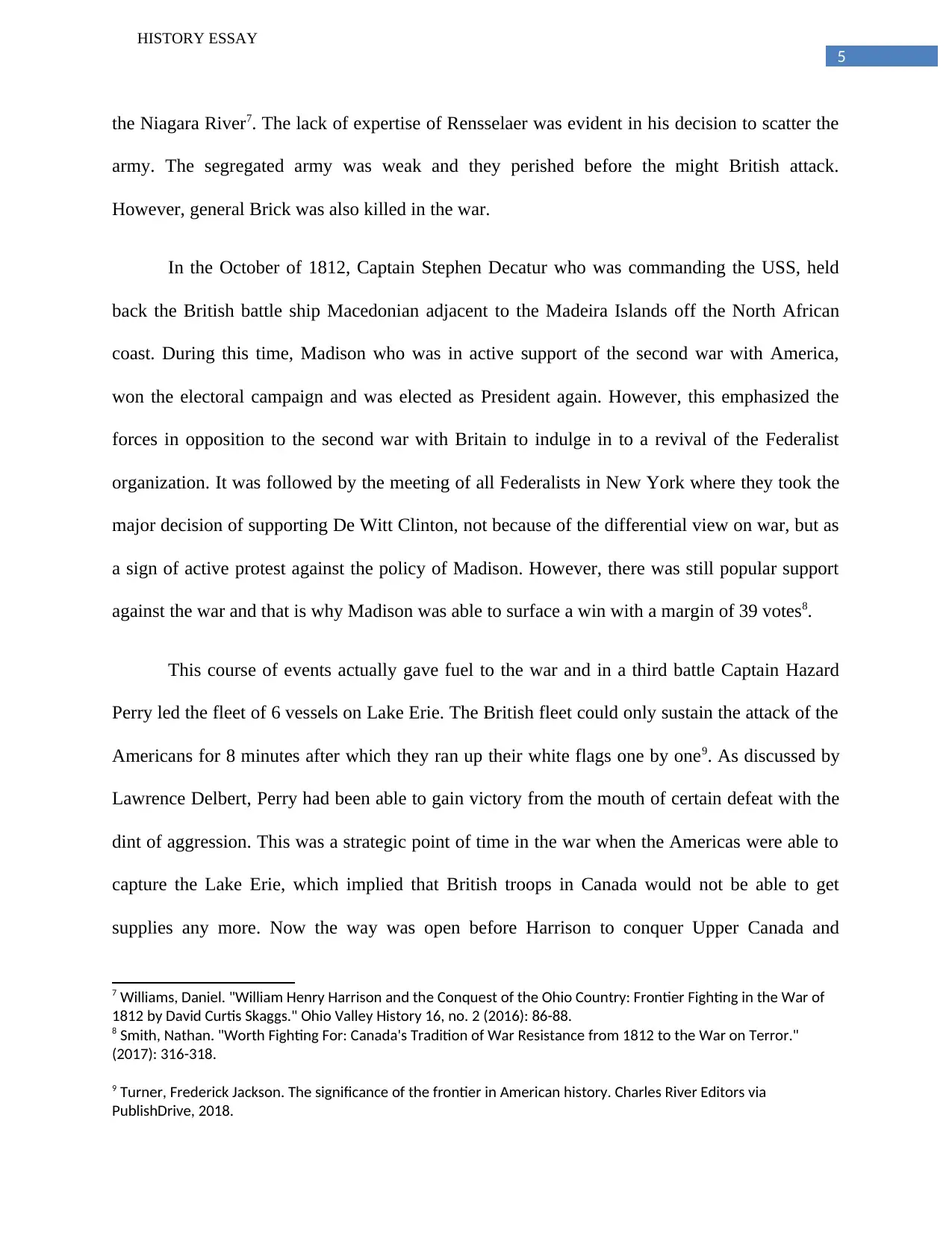
5
HISTORY ESSAY
the Niagara River7. The lack of expertise of Rensselaer was evident in his decision to scatter the
army. The segregated army was weak and they perished before the might British attack.
However, general Brick was also killed in the war.
In the October of 1812, Captain Stephen Decatur who was commanding the USS, held
back the British battle ship Macedonian adjacent to the Madeira Islands off the North African
coast. During this time, Madison who was in active support of the second war with America,
won the electoral campaign and was elected as President again. However, this emphasized the
forces in opposition to the second war with Britain to indulge in to a revival of the Federalist
organization. It was followed by the meeting of all Federalists in New York where they took the
major decision of supporting De Witt Clinton, not because of the differential view on war, but as
a sign of active protest against the policy of Madison. However, there was still popular support
against the war and that is why Madison was able to surface a win with a margin of 39 votes8.
This course of events actually gave fuel to the war and in a third battle Captain Hazard
Perry led the fleet of 6 vessels on Lake Erie. The British fleet could only sustain the attack of the
Americans for 8 minutes after which they ran up their white flags one by one9. As discussed by
Lawrence Delbert, Perry had been able to gain victory from the mouth of certain defeat with the
dint of aggression. This was a strategic point of time in the war when the Americas were able to
capture the Lake Erie, which implied that British troops in Canada would not be able to get
supplies any more. Now the way was open before Harrison to conquer Upper Canada and
7 Williams, Daniel. "William Henry Harrison and the Conquest of the Ohio Country: Frontier Fighting in the War of
1812 by David Curtis Skaggs." Ohio Valley History 16, no. 2 (2016): 86-88.
8 Smith, Nathan. "Worth Fighting For: Canada's Tradition of War Resistance from 1812 to the War on Terror."
(2017): 316-318.
9 Turner, Frederick Jackson. The significance of the frontier in American history. Charles River Editors via
PublishDrive, 2018.
HISTORY ESSAY
the Niagara River7. The lack of expertise of Rensselaer was evident in his decision to scatter the
army. The segregated army was weak and they perished before the might British attack.
However, general Brick was also killed in the war.
In the October of 1812, Captain Stephen Decatur who was commanding the USS, held
back the British battle ship Macedonian adjacent to the Madeira Islands off the North African
coast. During this time, Madison who was in active support of the second war with America,
won the electoral campaign and was elected as President again. However, this emphasized the
forces in opposition to the second war with Britain to indulge in to a revival of the Federalist
organization. It was followed by the meeting of all Federalists in New York where they took the
major decision of supporting De Witt Clinton, not because of the differential view on war, but as
a sign of active protest against the policy of Madison. However, there was still popular support
against the war and that is why Madison was able to surface a win with a margin of 39 votes8.
This course of events actually gave fuel to the war and in a third battle Captain Hazard
Perry led the fleet of 6 vessels on Lake Erie. The British fleet could only sustain the attack of the
Americans for 8 minutes after which they ran up their white flags one by one9. As discussed by
Lawrence Delbert, Perry had been able to gain victory from the mouth of certain defeat with the
dint of aggression. This was a strategic point of time in the war when the Americas were able to
capture the Lake Erie, which implied that British troops in Canada would not be able to get
supplies any more. Now the way was open before Harrison to conquer Upper Canada and
7 Williams, Daniel. "William Henry Harrison and the Conquest of the Ohio Country: Frontier Fighting in the War of
1812 by David Curtis Skaggs." Ohio Valley History 16, no. 2 (2016): 86-88.
8 Smith, Nathan. "Worth Fighting For: Canada's Tradition of War Resistance from 1812 to the War on Terror."
(2017): 316-318.
9 Turner, Frederick Jackson. The significance of the frontier in American history. Charles River Editors via
PublishDrive, 2018.
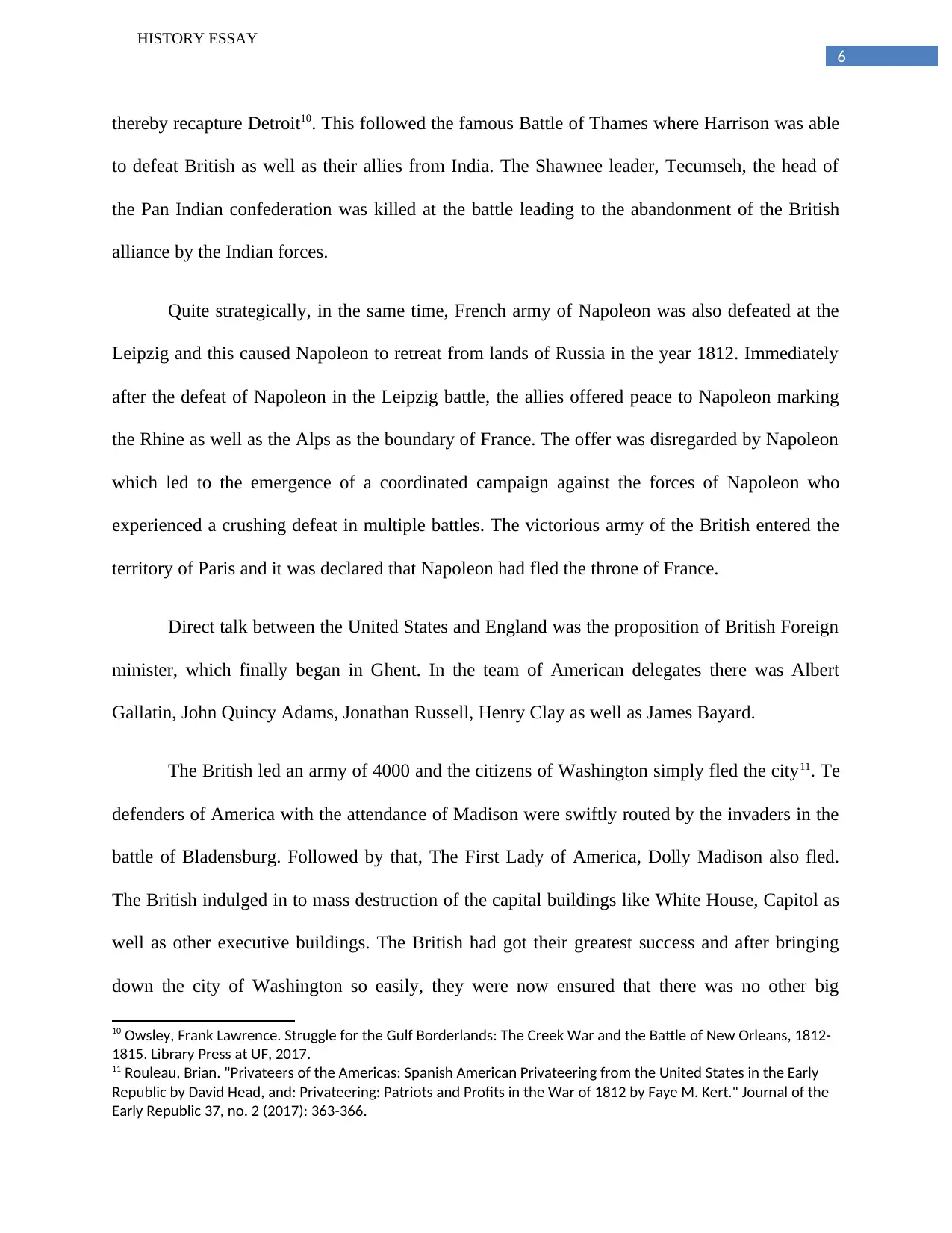
6
HISTORY ESSAY
thereby recapture Detroit10. This followed the famous Battle of Thames where Harrison was able
to defeat British as well as their allies from India. The Shawnee leader, Tecumseh, the head of
the Pan Indian confederation was killed at the battle leading to the abandonment of the British
alliance by the Indian forces.
Quite strategically, in the same time, French army of Napoleon was also defeated at the
Leipzig and this caused Napoleon to retreat from lands of Russia in the year 1812. Immediately
after the defeat of Napoleon in the Leipzig battle, the allies offered peace to Napoleon marking
the Rhine as well as the Alps as the boundary of France. The offer was disregarded by Napoleon
which led to the emergence of a coordinated campaign against the forces of Napoleon who
experienced a crushing defeat in multiple battles. The victorious army of the British entered the
territory of Paris and it was declared that Napoleon had fled the throne of France.
Direct talk between the United States and England was the proposition of British Foreign
minister, which finally began in Ghent. In the team of American delegates there was Albert
Gallatin, John Quincy Adams, Jonathan Russell, Henry Clay as well as James Bayard.
The British led an army of 4000 and the citizens of Washington simply fled the city11. Te
defenders of America with the attendance of Madison were swiftly routed by the invaders in the
battle of Bladensburg. Followed by that, The First Lady of America, Dolly Madison also fled.
The British indulged in to mass destruction of the capital buildings like White House, Capitol as
well as other executive buildings. The British had got their greatest success and after bringing
down the city of Washington so easily, they were now ensured that there was no other big
10 Owsley, Frank Lawrence. Struggle for the Gulf Borderlands: The Creek War and the Battle of New Orleans, 1812-
1815. Library Press at UF, 2017.
11 Rouleau, Brian. "Privateers of the Americas: Spanish American Privateering from the United States in the Early
Republic by David Head, and: Privateering: Patriots and Profits in the War of 1812 by Faye M. Kert." Journal of the
Early Republic 37, no. 2 (2017): 363-366.
HISTORY ESSAY
thereby recapture Detroit10. This followed the famous Battle of Thames where Harrison was able
to defeat British as well as their allies from India. The Shawnee leader, Tecumseh, the head of
the Pan Indian confederation was killed at the battle leading to the abandonment of the British
alliance by the Indian forces.
Quite strategically, in the same time, French army of Napoleon was also defeated at the
Leipzig and this caused Napoleon to retreat from lands of Russia in the year 1812. Immediately
after the defeat of Napoleon in the Leipzig battle, the allies offered peace to Napoleon marking
the Rhine as well as the Alps as the boundary of France. The offer was disregarded by Napoleon
which led to the emergence of a coordinated campaign against the forces of Napoleon who
experienced a crushing defeat in multiple battles. The victorious army of the British entered the
territory of Paris and it was declared that Napoleon had fled the throne of France.
Direct talk between the United States and England was the proposition of British Foreign
minister, which finally began in Ghent. In the team of American delegates there was Albert
Gallatin, John Quincy Adams, Jonathan Russell, Henry Clay as well as James Bayard.
The British led an army of 4000 and the citizens of Washington simply fled the city11. Te
defenders of America with the attendance of Madison were swiftly routed by the invaders in the
battle of Bladensburg. Followed by that, The First Lady of America, Dolly Madison also fled.
The British indulged in to mass destruction of the capital buildings like White House, Capitol as
well as other executive buildings. The British had got their greatest success and after bringing
down the city of Washington so easily, they were now ensured that there was no other big
10 Owsley, Frank Lawrence. Struggle for the Gulf Borderlands: The Creek War and the Battle of New Orleans, 1812-
1815. Library Press at UF, 2017.
11 Rouleau, Brian. "Privateers of the Americas: Spanish American Privateering from the United States in the Early
Republic by David Head, and: Privateering: Patriots and Profits in the War of 1812 by Faye M. Kert." Journal of the
Early Republic 37, no. 2 (2017): 363-366.
⊘ This is a preview!⊘
Do you want full access?
Subscribe today to unlock all pages.

Trusted by 1+ million students worldwide
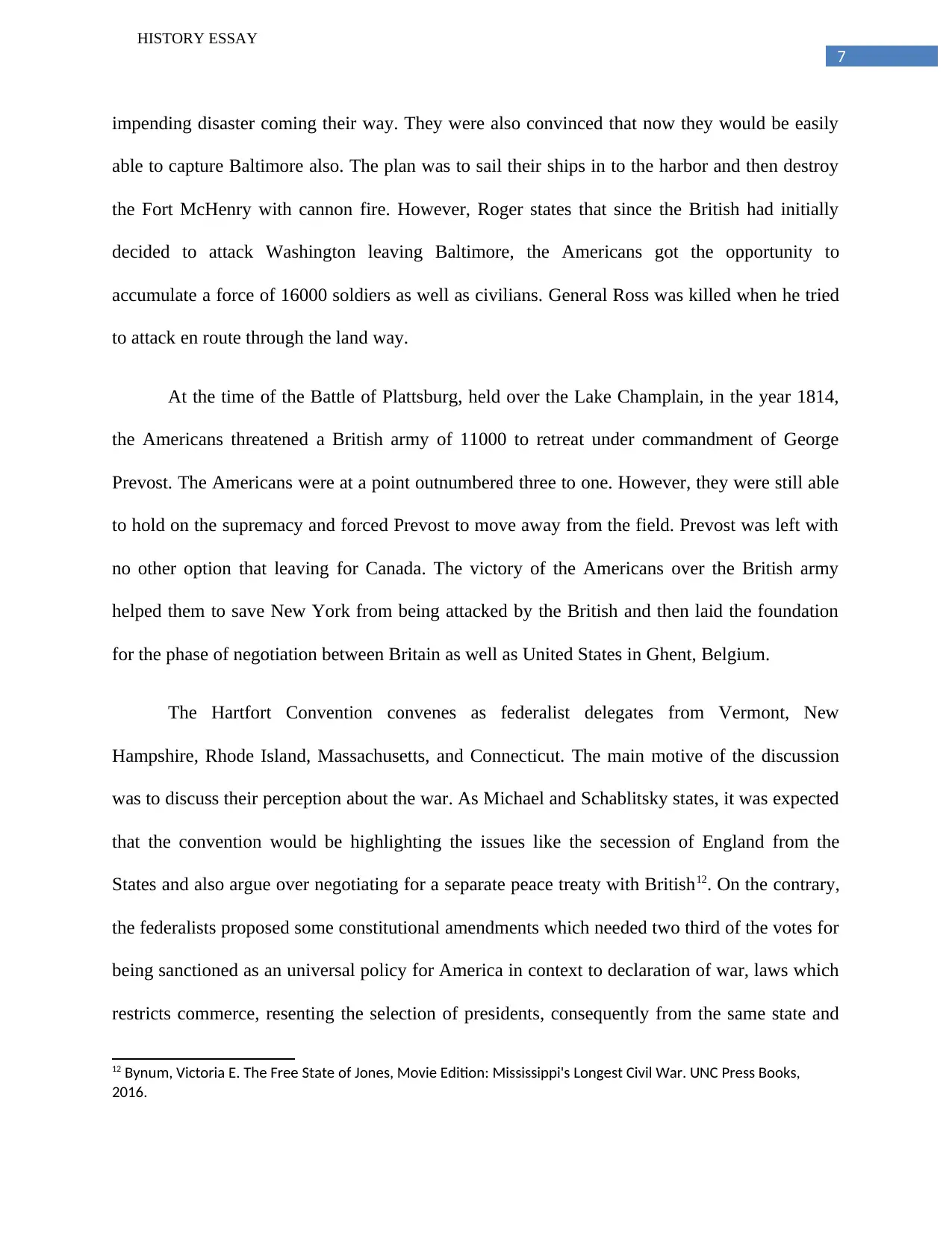
7
HISTORY ESSAY
impending disaster coming their way. They were also convinced that now they would be easily
able to capture Baltimore also. The plan was to sail their ships in to the harbor and then destroy
the Fort McHenry with cannon fire. However, Roger states that since the British had initially
decided to attack Washington leaving Baltimore, the Americans got the opportunity to
accumulate a force of 16000 soldiers as well as civilians. General Ross was killed when he tried
to attack en route through the land way.
At the time of the Battle of Plattsburg, held over the Lake Champlain, in the year 1814,
the Americans threatened a British army of 11000 to retreat under commandment of George
Prevost. The Americans were at a point outnumbered three to one. However, they were still able
to hold on the supremacy and forced Prevost to move away from the field. Prevost was left with
no other option that leaving for Canada. The victory of the Americans over the British army
helped them to save New York from being attacked by the British and then laid the foundation
for the phase of negotiation between Britain as well as United States in Ghent, Belgium.
The Hartfort Convention convenes as federalist delegates from Vermont, New
Hampshire, Rhode Island, Massachusetts, and Connecticut. The main motive of the discussion
was to discuss their perception about the war. As Michael and Schablitsky states, it was expected
that the convention would be highlighting the issues like the secession of England from the
States and also argue over negotiating for a separate peace treaty with British12. On the contrary,
the federalists proposed some constitutional amendments which needed two third of the votes for
being sanctioned as an universal policy for America in context to declaration of war, laws which
restricts commerce, resenting the selection of presidents, consequently from the same state and
12 Bynum, Victoria E. The Free State of Jones, Movie Edition: Mississippi's Longest Civil War. UNC Press Books,
2016.
HISTORY ESSAY
impending disaster coming their way. They were also convinced that now they would be easily
able to capture Baltimore also. The plan was to sail their ships in to the harbor and then destroy
the Fort McHenry with cannon fire. However, Roger states that since the British had initially
decided to attack Washington leaving Baltimore, the Americans got the opportunity to
accumulate a force of 16000 soldiers as well as civilians. General Ross was killed when he tried
to attack en route through the land way.
At the time of the Battle of Plattsburg, held over the Lake Champlain, in the year 1814,
the Americans threatened a British army of 11000 to retreat under commandment of George
Prevost. The Americans were at a point outnumbered three to one. However, they were still able
to hold on the supremacy and forced Prevost to move away from the field. Prevost was left with
no other option that leaving for Canada. The victory of the Americans over the British army
helped them to save New York from being attacked by the British and then laid the foundation
for the phase of negotiation between Britain as well as United States in Ghent, Belgium.
The Hartfort Convention convenes as federalist delegates from Vermont, New
Hampshire, Rhode Island, Massachusetts, and Connecticut. The main motive of the discussion
was to discuss their perception about the war. As Michael and Schablitsky states, it was expected
that the convention would be highlighting the issues like the secession of England from the
States and also argue over negotiating for a separate peace treaty with British12. On the contrary,
the federalists proposed some constitutional amendments which needed two third of the votes for
being sanctioned as an universal policy for America in context to declaration of war, laws which
restricts commerce, resenting the selection of presidents, consequently from the same state and
12 Bynum, Victoria E. The Free State of Jones, Movie Edition: Mississippi's Longest Civil War. UNC Press Books,
2016.
Paraphrase This Document
Need a fresh take? Get an instant paraphrase of this document with our AI Paraphraser
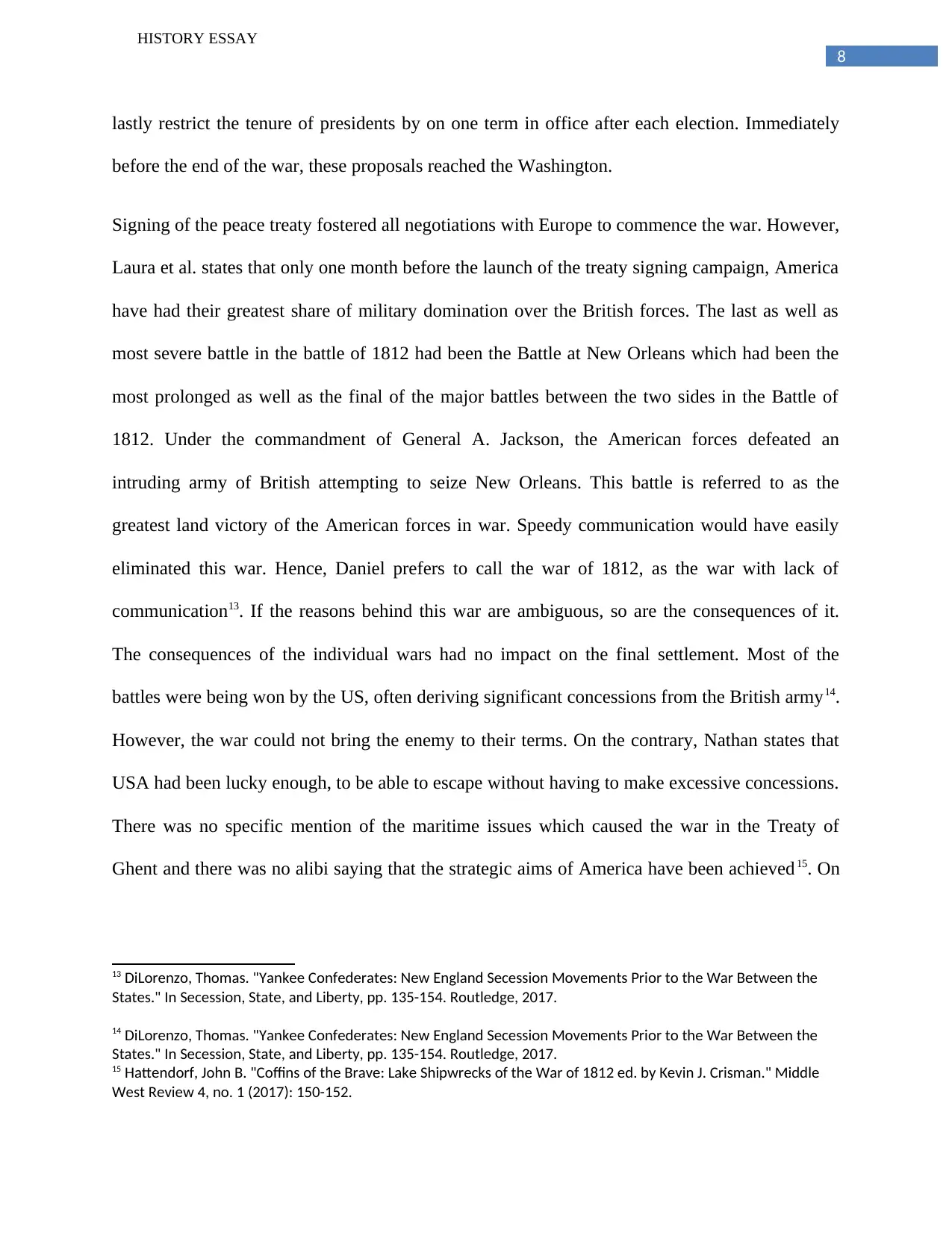
8
HISTORY ESSAY
lastly restrict the tenure of presidents by on one term in office after each election. Immediately
before the end of the war, these proposals reached the Washington.
Signing of the peace treaty fostered all negotiations with Europe to commence the war. However,
Laura et al. states that only one month before the launch of the treaty signing campaign, America
have had their greatest share of military domination over the British forces. The last as well as
most severe battle in the battle of 1812 had been the Battle at New Orleans which had been the
most prolonged as well as the final of the major battles between the two sides in the Battle of
1812. Under the commandment of General A. Jackson, the American forces defeated an
intruding army of British attempting to seize New Orleans. This battle is referred to as the
greatest land victory of the American forces in war. Speedy communication would have easily
eliminated this war. Hence, Daniel prefers to call the war of 1812, as the war with lack of
communication13. If the reasons behind this war are ambiguous, so are the consequences of it.
The consequences of the individual wars had no impact on the final settlement. Most of the
battles were being won by the US, often deriving significant concessions from the British army14.
However, the war could not bring the enemy to their terms. On the contrary, Nathan states that
USA had been lucky enough, to be able to escape without having to make excessive concessions.
There was no specific mention of the maritime issues which caused the war in the Treaty of
Ghent and there was no alibi saying that the strategic aims of America have been achieved15. On
13 DiLorenzo, Thomas. "Yankee Confederates: New England Secession Movements Prior to the War Between the
States." In Secession, State, and Liberty, pp. 135-154. Routledge, 2017.
14 DiLorenzo, Thomas. "Yankee Confederates: New England Secession Movements Prior to the War Between the
States." In Secession, State, and Liberty, pp. 135-154. Routledge, 2017.
15 Hattendorf, John B. "Coffins of the Brave: Lake Shipwrecks of the War of 1812 ed. by Kevin J. Crisman." Middle
West Review 4, no. 1 (2017): 150-152.
HISTORY ESSAY
lastly restrict the tenure of presidents by on one term in office after each election. Immediately
before the end of the war, these proposals reached the Washington.
Signing of the peace treaty fostered all negotiations with Europe to commence the war. However,
Laura et al. states that only one month before the launch of the treaty signing campaign, America
have had their greatest share of military domination over the British forces. The last as well as
most severe battle in the battle of 1812 had been the Battle at New Orleans which had been the
most prolonged as well as the final of the major battles between the two sides in the Battle of
1812. Under the commandment of General A. Jackson, the American forces defeated an
intruding army of British attempting to seize New Orleans. This battle is referred to as the
greatest land victory of the American forces in war. Speedy communication would have easily
eliminated this war. Hence, Daniel prefers to call the war of 1812, as the war with lack of
communication13. If the reasons behind this war are ambiguous, so are the consequences of it.
The consequences of the individual wars had no impact on the final settlement. Most of the
battles were being won by the US, often deriving significant concessions from the British army14.
However, the war could not bring the enemy to their terms. On the contrary, Nathan states that
USA had been lucky enough, to be able to escape without having to make excessive concessions.
There was no specific mention of the maritime issues which caused the war in the Treaty of
Ghent and there was no alibi saying that the strategic aims of America have been achieved15. On
13 DiLorenzo, Thomas. "Yankee Confederates: New England Secession Movements Prior to the War Between the
States." In Secession, State, and Liberty, pp. 135-154. Routledge, 2017.
14 DiLorenzo, Thomas. "Yankee Confederates: New England Secession Movements Prior to the War Between the
States." In Secession, State, and Liberty, pp. 135-154. Routledge, 2017.
15 Hattendorf, John B. "Coffins of the Brave: Lake Shipwrecks of the War of 1812 ed. by Kevin J. Crisman." Middle
West Review 4, no. 1 (2017): 150-152.
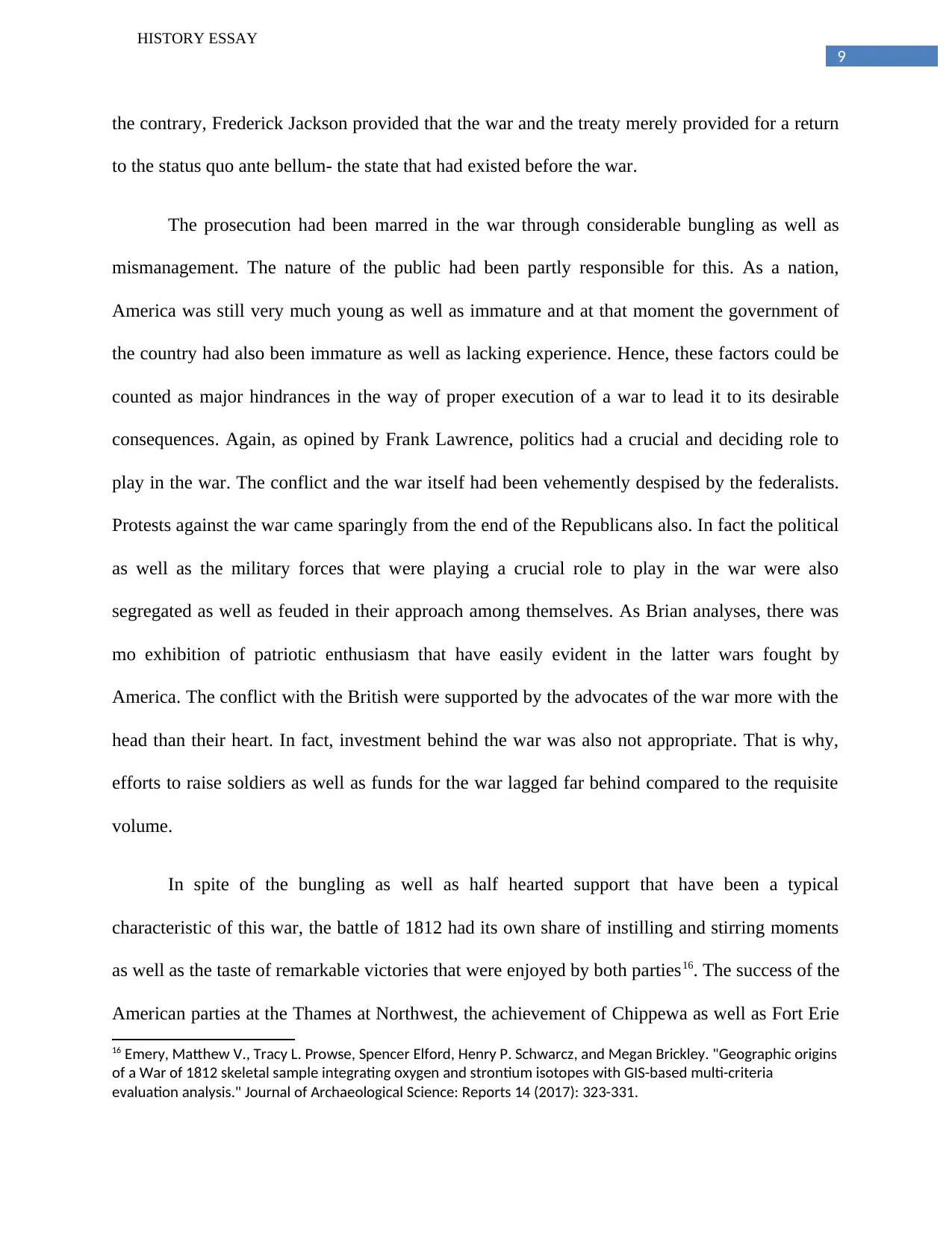
9
HISTORY ESSAY
the contrary, Frederick Jackson provided that the war and the treaty merely provided for a return
to the status quo ante bellum- the state that had existed before the war.
The prosecution had been marred in the war through considerable bungling as well as
mismanagement. The nature of the public had been partly responsible for this. As a nation,
America was still very much young as well as immature and at that moment the government of
the country had also been immature as well as lacking experience. Hence, these factors could be
counted as major hindrances in the way of proper execution of a war to lead it to its desirable
consequences. Again, as opined by Frank Lawrence, politics had a crucial and deciding role to
play in the war. The conflict and the war itself had been vehemently despised by the federalists.
Protests against the war came sparingly from the end of the Republicans also. In fact the political
as well as the military forces that were playing a crucial role to play in the war were also
segregated as well as feuded in their approach among themselves. As Brian analyses, there was
mo exhibition of patriotic enthusiasm that have easily evident in the latter wars fought by
America. The conflict with the British were supported by the advocates of the war more with the
head than their heart. In fact, investment behind the war was also not appropriate. That is why,
efforts to raise soldiers as well as funds for the war lagged far behind compared to the requisite
volume.
In spite of the bungling as well as half hearted support that have been a typical
characteristic of this war, the battle of 1812 had its own share of instilling and stirring moments
as well as the taste of remarkable victories that were enjoyed by both parties16. The success of the
American parties at the Thames at Northwest, the achievement of Chippewa as well as Fort Erie
16 Emery, Matthew V., Tracy L. Prowse, Spencer Elford, Henry P. Schwarcz, and Megan Brickley. "Geographic origins
of a War of 1812 skeletal sample integrating oxygen and strontium isotopes with GIS-based multi-criteria
evaluation analysis." Journal of Archaeological Science: Reports 14 (2017): 323-331.
HISTORY ESSAY
the contrary, Frederick Jackson provided that the war and the treaty merely provided for a return
to the status quo ante bellum- the state that had existed before the war.
The prosecution had been marred in the war through considerable bungling as well as
mismanagement. The nature of the public had been partly responsible for this. As a nation,
America was still very much young as well as immature and at that moment the government of
the country had also been immature as well as lacking experience. Hence, these factors could be
counted as major hindrances in the way of proper execution of a war to lead it to its desirable
consequences. Again, as opined by Frank Lawrence, politics had a crucial and deciding role to
play in the war. The conflict and the war itself had been vehemently despised by the federalists.
Protests against the war came sparingly from the end of the Republicans also. In fact the political
as well as the military forces that were playing a crucial role to play in the war were also
segregated as well as feuded in their approach among themselves. As Brian analyses, there was
mo exhibition of patriotic enthusiasm that have easily evident in the latter wars fought by
America. The conflict with the British were supported by the advocates of the war more with the
head than their heart. In fact, investment behind the war was also not appropriate. That is why,
efforts to raise soldiers as well as funds for the war lagged far behind compared to the requisite
volume.
In spite of the bungling as well as half hearted support that have been a typical
characteristic of this war, the battle of 1812 had its own share of instilling and stirring moments
as well as the taste of remarkable victories that were enjoyed by both parties16. The success of the
American parties at the Thames at Northwest, the achievement of Chippewa as well as Fort Erie
16 Emery, Matthew V., Tracy L. Prowse, Spencer Elford, Henry P. Schwarcz, and Megan Brickley. "Geographic origins
of a War of 1812 skeletal sample integrating oxygen and strontium isotopes with GIS-based multi-criteria
evaluation analysis." Journal of Archaeological Science: Reports 14 (2017): 323-331.
⊘ This is a preview!⊘
Do you want full access?
Subscribe today to unlock all pages.

Trusted by 1+ million students worldwide
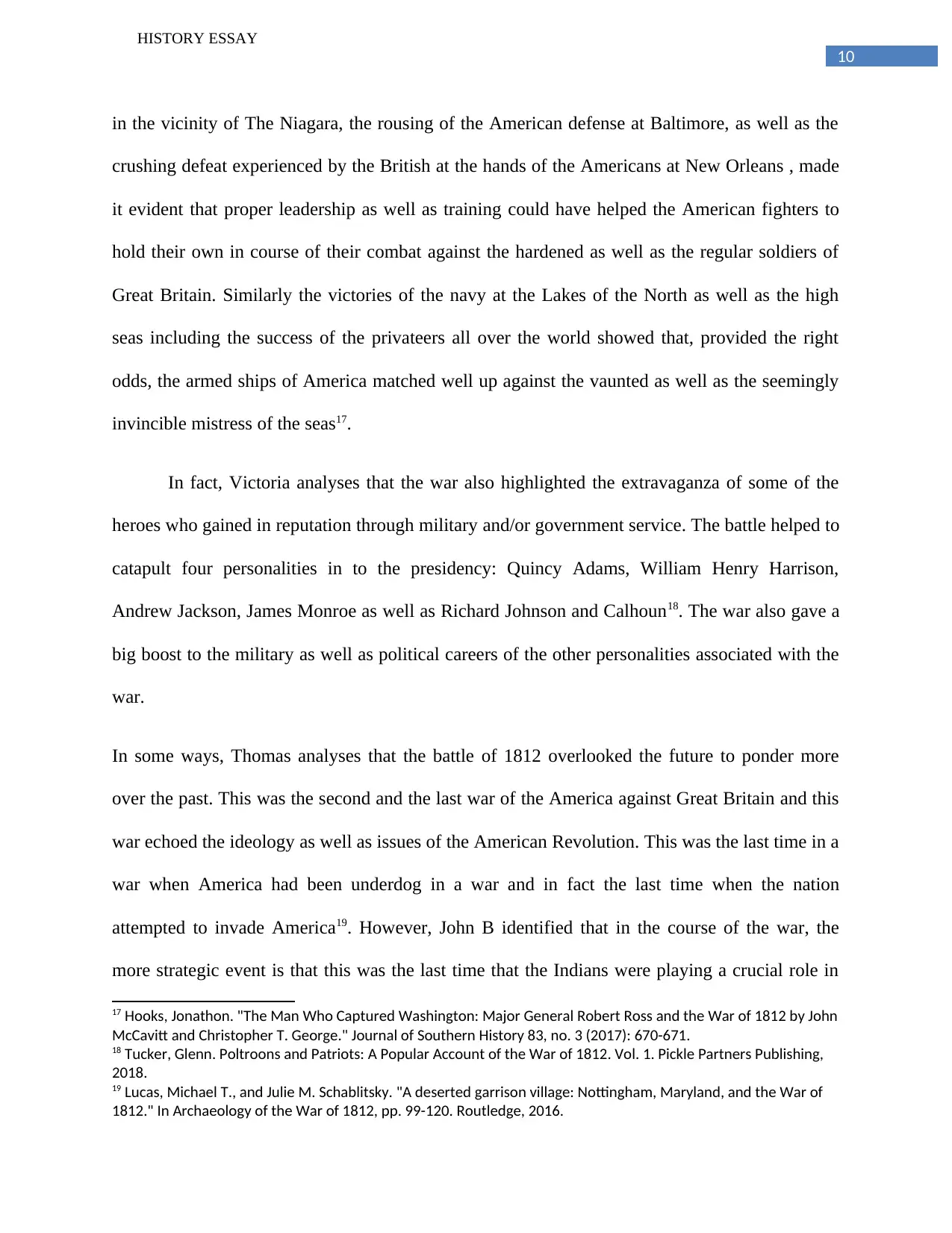
10
HISTORY ESSAY
in the vicinity of The Niagara, the rousing of the American defense at Baltimore, as well as the
crushing defeat experienced by the British at the hands of the Americans at New Orleans , made
it evident that proper leadership as well as training could have helped the American fighters to
hold their own in course of their combat against the hardened as well as the regular soldiers of
Great Britain. Similarly the victories of the navy at the Lakes of the North as well as the high
seas including the success of the privateers all over the world showed that, provided the right
odds, the armed ships of America matched well up against the vaunted as well as the seemingly
invincible mistress of the seas17.
In fact, Victoria analyses that the war also highlighted the extravaganza of some of the
heroes who gained in reputation through military and/or government service. The battle helped to
catapult four personalities in to the presidency: Quincy Adams, William Henry Harrison,
Andrew Jackson, James Monroe as well as Richard Johnson and Calhoun18. The war also gave a
big boost to the military as well as political careers of the other personalities associated with the
war.
In some ways, Thomas analyses that the battle of 1812 overlooked the future to ponder more
over the past. This was the second and the last war of the America against Great Britain and this
war echoed the ideology as well as issues of the American Revolution. This was the last time in a
war when America had been underdog in a war and in fact the last time when the nation
attempted to invade America19. However, John B identified that in the course of the war, the
more strategic event is that this was the last time that the Indians were playing a crucial role in
17 Hooks, Jonathon. "The Man Who Captured Washington: Major General Robert Ross and the War of 1812 by John
McCavitt and Christopher T. George." Journal of Southern History 83, no. 3 (2017): 670-671.
18 Tucker, Glenn. Poltroons and Patriots: A Popular Account of the War of 1812. Vol. 1. Pickle Partners Publishing,
2018.
19 Lucas, Michael T., and Julie M. Schablitsky. "A deserted garrison village: Nottingham, Maryland, and the War of
1812." In Archaeology of the War of 1812, pp. 99-120. Routledge, 2016.
HISTORY ESSAY
in the vicinity of The Niagara, the rousing of the American defense at Baltimore, as well as the
crushing defeat experienced by the British at the hands of the Americans at New Orleans , made
it evident that proper leadership as well as training could have helped the American fighters to
hold their own in course of their combat against the hardened as well as the regular soldiers of
Great Britain. Similarly the victories of the navy at the Lakes of the North as well as the high
seas including the success of the privateers all over the world showed that, provided the right
odds, the armed ships of America matched well up against the vaunted as well as the seemingly
invincible mistress of the seas17.
In fact, Victoria analyses that the war also highlighted the extravaganza of some of the
heroes who gained in reputation through military and/or government service. The battle helped to
catapult four personalities in to the presidency: Quincy Adams, William Henry Harrison,
Andrew Jackson, James Monroe as well as Richard Johnson and Calhoun18. The war also gave a
big boost to the military as well as political careers of the other personalities associated with the
war.
In some ways, Thomas analyses that the battle of 1812 overlooked the future to ponder more
over the past. This was the second and the last war of the America against Great Britain and this
war echoed the ideology as well as issues of the American Revolution. This was the last time in a
war when America had been underdog in a war and in fact the last time when the nation
attempted to invade America19. However, John B identified that in the course of the war, the
more strategic event is that this was the last time that the Indians were playing a crucial role in
17 Hooks, Jonathon. "The Man Who Captured Washington: Major General Robert Ross and the War of 1812 by John
McCavitt and Christopher T. George." Journal of Southern History 83, no. 3 (2017): 670-671.
18 Tucker, Glenn. Poltroons and Patriots: A Popular Account of the War of 1812. Vol. 1. Pickle Partners Publishing,
2018.
19 Lucas, Michael T., and Julie M. Schablitsky. "A deserted garrison village: Nottingham, Maryland, and the War of
1812." In Archaeology of the War of 1812, pp. 99-120. Routledge, 2016.
Paraphrase This Document
Need a fresh take? Get an instant paraphrase of this document with our AI Paraphraser
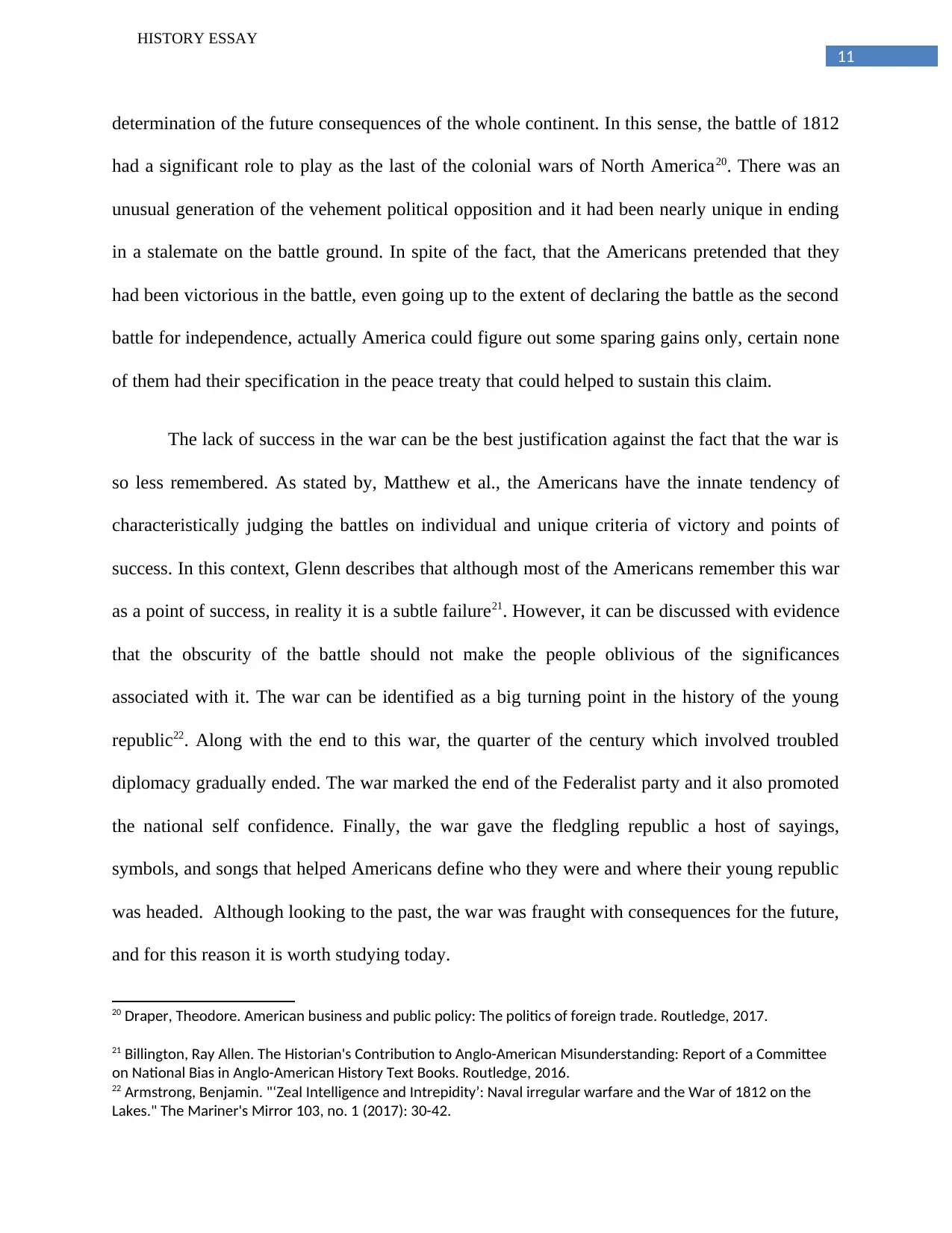
11
HISTORY ESSAY
determination of the future consequences of the whole continent. In this sense, the battle of 1812
had a significant role to play as the last of the colonial wars of North America20. There was an
unusual generation of the vehement political opposition and it had been nearly unique in ending
in a stalemate on the battle ground. In spite of the fact, that the Americans pretended that they
had been victorious in the battle, even going up to the extent of declaring the battle as the second
battle for independence, actually America could figure out some sparing gains only, certain none
of them had their specification in the peace treaty that could helped to sustain this claim.
The lack of success in the war can be the best justification against the fact that the war is
so less remembered. As stated by, Matthew et al., the Americans have the innate tendency of
characteristically judging the battles on individual and unique criteria of victory and points of
success. In this context, Glenn describes that although most of the Americans remember this war
as a point of success, in reality it is a subtle failure21. However, it can be discussed with evidence
that the obscurity of the battle should not make the people oblivious of the significances
associated with it. The war can be identified as a big turning point in the history of the young
republic22. Along with the end to this war, the quarter of the century which involved troubled
diplomacy gradually ended. The war marked the end of the Federalist party and it also promoted
the national self confidence. Finally, the war gave the fledgling republic a host of sayings,
symbols, and songs that helped Americans define who they were and where their young republic
was headed. Although looking to the past, the war was fraught with consequences for the future,
and for this reason it is worth studying today.
20 Draper, Theodore. American business and public policy: The politics of foreign trade. Routledge, 2017.
21 Billington, Ray Allen. The Historian's Contribution to Anglo-American Misunderstanding: Report of a Committee
on National Bias in Anglo-American History Text Books. Routledge, 2016.
22 Armstrong, Benjamin. "‘Zeal Intelligence and Intrepidity’: Naval irregular warfare and the War of 1812 on the
Lakes." The Mariner's Mirror 103, no. 1 (2017): 30-42.
HISTORY ESSAY
determination of the future consequences of the whole continent. In this sense, the battle of 1812
had a significant role to play as the last of the colonial wars of North America20. There was an
unusual generation of the vehement political opposition and it had been nearly unique in ending
in a stalemate on the battle ground. In spite of the fact, that the Americans pretended that they
had been victorious in the battle, even going up to the extent of declaring the battle as the second
battle for independence, actually America could figure out some sparing gains only, certain none
of them had their specification in the peace treaty that could helped to sustain this claim.
The lack of success in the war can be the best justification against the fact that the war is
so less remembered. As stated by, Matthew et al., the Americans have the innate tendency of
characteristically judging the battles on individual and unique criteria of victory and points of
success. In this context, Glenn describes that although most of the Americans remember this war
as a point of success, in reality it is a subtle failure21. However, it can be discussed with evidence
that the obscurity of the battle should not make the people oblivious of the significances
associated with it. The war can be identified as a big turning point in the history of the young
republic22. Along with the end to this war, the quarter of the century which involved troubled
diplomacy gradually ended. The war marked the end of the Federalist party and it also promoted
the national self confidence. Finally, the war gave the fledgling republic a host of sayings,
symbols, and songs that helped Americans define who they were and where their young republic
was headed. Although looking to the past, the war was fraught with consequences for the future,
and for this reason it is worth studying today.
20 Draper, Theodore. American business and public policy: The politics of foreign trade. Routledge, 2017.
21 Billington, Ray Allen. The Historian's Contribution to Anglo-American Misunderstanding: Report of a Committee
on National Bias in Anglo-American History Text Books. Routledge, 2016.
22 Armstrong, Benjamin. "‘Zeal Intelligence and Intrepidity’: Naval irregular warfare and the War of 1812 on the
Lakes." The Mariner's Mirror 103, no. 1 (2017): 30-42.

12
HISTORY ESSAY
HISTORY ESSAY
⊘ This is a preview!⊘
Do you want full access?
Subscribe today to unlock all pages.

Trusted by 1+ million students worldwide
1 out of 15
Related Documents
Your All-in-One AI-Powered Toolkit for Academic Success.
+13062052269
info@desklib.com
Available 24*7 on WhatsApp / Email
![[object Object]](/_next/static/media/star-bottom.7253800d.svg)
Unlock your academic potential
Copyright © 2020–2026 A2Z Services. All Rights Reserved. Developed and managed by ZUCOL.





